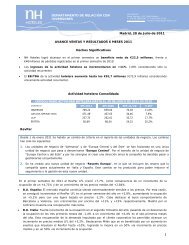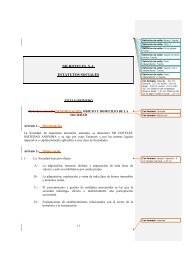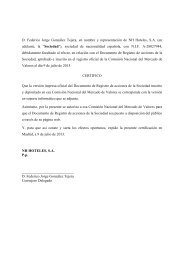Consolidated Financial Statements and Consolidated Management ...
Consolidated Financial Statements and Consolidated Management ...
Consolidated Financial Statements and Consolidated Management ...
You also want an ePaper? Increase the reach of your titles
YUMPU automatically turns print PDFs into web optimized ePapers that Google loves.
The Board of Directors, if it so decides, may release the outgoing director from this obligation or reduce its applicable period.<br />
Proposals to re-elect directors put before the General Shareholders’ Meeting by the Board of Directors must be subject to a formal procedure, which<br />
must include a report issued by the Appointments <strong>and</strong> Remuneration Committee that evaluates the quality <strong>and</strong> dedication of the proposed directors<br />
to the position during their m<strong>and</strong>ate.<br />
The Appointments <strong>and</strong> Remuneration Committee is the competent body for reviewing the criteria that must be followed regarding the composition of<br />
the Board of Directors <strong>and</strong> the selection of c<strong>and</strong>idates.<br />
The Board shall annually evaluate the quality <strong>and</strong> effectiveness of the functioning of the Board, based on a prior report from the Appointments <strong>and</strong><br />
Remuneration Committee, as well as the performance of the Chairman <strong>and</strong>/or Chief Executive Director of the Company.<br />
6. Removal of Directors<br />
Directors shall step down when the period for which they were appointed comes to an end or when agreed by the General Shareholders’ Meeting<br />
based on the powers legally attributed to it.<br />
Directors shall place their office at the disposal of the Board of Directors <strong>and</strong> tender their resignation in any of the following circumstances:<br />
a) When they reach the age of seventy. Directors performing executive functions shall st<strong>and</strong> down from such office when they reach the age of sixty-five,<br />
though they may continue holding the office of director, should the Board so resolve.<br />
b) Where they are removed from the executive offices to which their appointment as a director was associated or where the reasons for which they were<br />
appointed no longer exist. It shall be construed that such a circumstance comes about for a proprietary director where the company or business<br />
group such director represents ceases to hold a significant shareholding in the company’s share capital or where, in the case of an independent<br />
director, he/she becomes an executive of the company or of any of its subsidiaries.<br />
c) Where they fulfil any of the situations for incapacity, incompatibility or prohibition set forth in legal provisions, along with any of the other<br />
circumstances laid down in the Board Regulations.<br />
d) Where they are seriously reprim<strong>and</strong>ed by the Appointments <strong>and</strong> Remuneration Committee for having breached any of their obligations as directors.<br />
e) Where their permanence on the Board may affect the company’s good st<strong>and</strong>ing or reputation in the market or jeopardise its interests in any other<br />
way whatsoever.<br />
To be a member of the Board, directors shall not be involved in any of the situations for incapacity, incompatibility or prohibition set forth in prevailing<br />
legislation.<br />
B.1.20. State the cases in which directors are obliged to resign.<br />
Directors shall step down when the period for which they were appointed comes to an end or when agreed by the General Shareholders’ Meeting<br />
based on the powers legally attributed to it.<br />
In addition, Directors shall place their office at the disposal of the Board of Directors <strong>and</strong> tender their resignation in any of the following circumstances:<br />
a) When they reach the age of seventy. Directors performing executive functions shall st<strong>and</strong> down from such office when they reach the age of sixty-five,<br />
though they may continue holding the office of director, should the Board so resolve.<br />
b) Where they are removed from the executive offices to which their appointment as a director was associated or where the reasons for which they have<br />
been appointed disappear. It shall be construed that such a circumstance comes about for a proprietary director when the company or business<br />
group such director represents ceases to hold a significant shareholding in the company’s share capital or where, in the case of an independent<br />
director, he/she becomes an executive of the company or of any of its subsidiaries.<br />
c) Where they fulfil any of the situations for incapacity, incompatibility or prohibition set forth in legal provisions, along with any of the other<br />
circumstances laid down in the Board Regulations. For such a purpose, any person with direct or indirect interests of any kind or who has any kind of<br />
employment, professional or commercial relationship of any kind whatsoever with competing companies shall be deemed unfit to hold the office of<br />
Director, except where the Board of Directors resolves to waive this rule with a favourable vote of at least 70% of its members<br />
d) Where they are seriously reprim<strong>and</strong>ed by the Appointments <strong>and</strong> Remuneration Committee for having breached any of their obligations as directors.<br />
e) Where their permanence on the Board may affect the company’s good st<strong>and</strong>ing or reputation in the market or jeopardise its interests in any other<br />
way whatsoever.<br />
B.1.21. Explain whether the post of chief executive director of the company is also held by the chairman of the Board. If so, state the<br />
measures that have been taken to limit the risks of concentrating powers in a single person:<br />
YES<br />
Measures to limit risks<br />
Article 17 of the Regulations of the Board of Directors state that the Executive Chairman shall hold the position of Chief Executive Director of the<br />
Company [.], who shall be responsible for the effective management of the businesses of the Company, always in accordance with the decisions<br />
<strong>and</strong> criteria set by the General Shareholder’s Meeting <strong>and</strong> the Board of Directors. As a result, the decisions of the Chairman shall be subject to <strong>and</strong><br />
controlled by the General Shareholders’ Meeting <strong>and</strong> the Board of Directors in all cases. Similarly, all resolutions <strong>and</strong> decisions of special relevance to<br />
the Company must be previously approved by the Board of Directors or the corresponding control committee. Furthermore, certain resolutions can<br />
only be adopted upon receipt of the reports <strong>and</strong> proposals drawn up by different Board committees.<br />
In addition, the Regulations of the Board (Article 21.2) empower directors to ask the Chairman to include items on the agenda, <strong>and</strong> the Chairman is<br />
obliged to include these when the request has been made at least ten days prior to the date set for the meeting <strong>and</strong> is accompanied by the relevant<br />
documentation needed for said items to be communicated to the other members of the Board.<br />
Lastly, it should be expressly noted that when the Chairman of the Board is also the Chief Executive Director of the company, the Board shall appoint<br />
one of the independent directors to coordinate <strong>and</strong> represent the concerns of the external directors <strong>and</strong> to oversee the evaluation of the Chairman by<br />
the Board (Article 21.5 of the Regulations of the Board).<br />
26<br />
ANNUAL CORPORATE GOVERNANCE REPORT
















